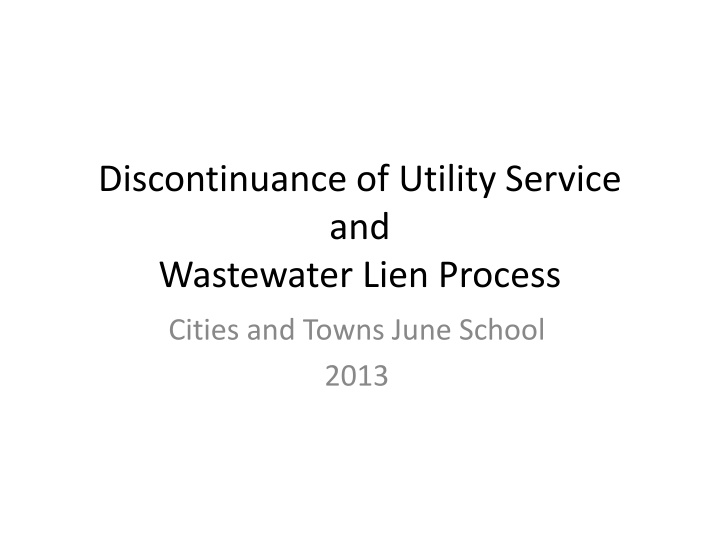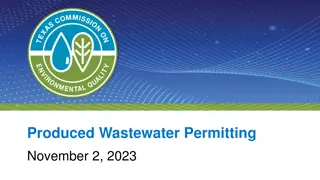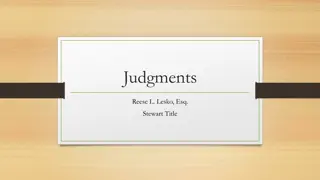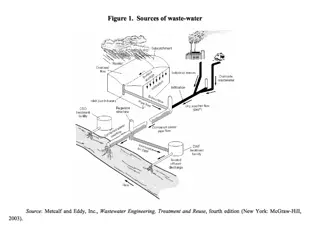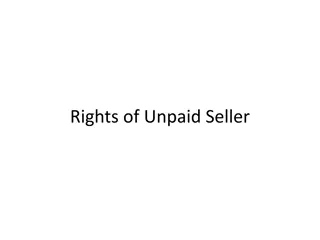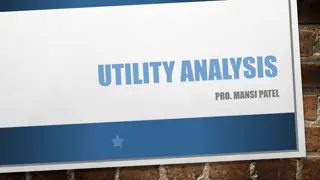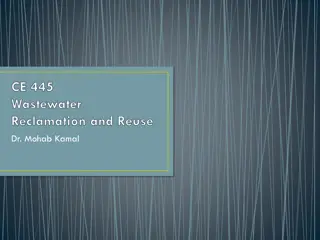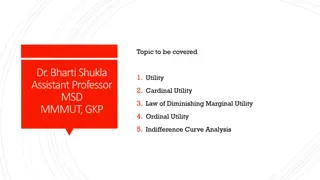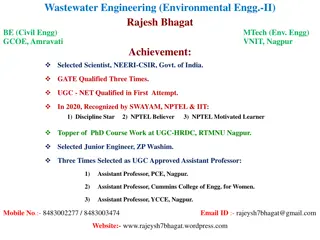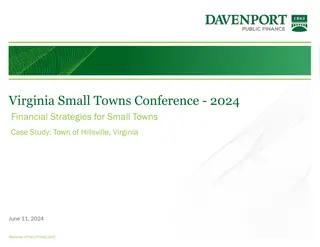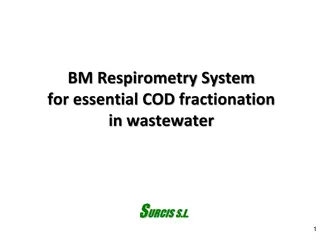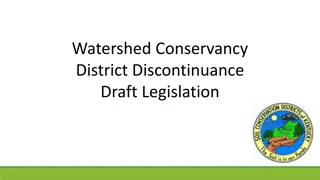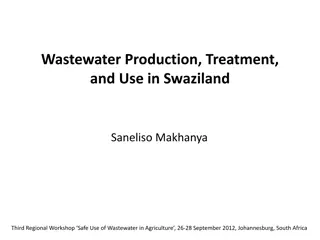Discontinuance of Utility Service and Wastewater Lien Process in Cities and Towns (June School 2013)
The process of discontinuing utility services, particularly water and wastewater services, due to nonpayment of charges is outlined in statutes such as IC 8-1.5-3-4 and IC 36-9-23-6. The statutes provide guidelines for discontinuing water service to consumers or properties after a specified period of nonpayment, along with the required written notice procedures. Additionally, IC 36-9-25-11.5 allows for the discontinuation of water service to delinquent sewer users under certain contractual agreements.
Download Presentation

Please find below an Image/Link to download the presentation.
The content on the website is provided AS IS for your information and personal use only. It may not be sold, licensed, or shared on other websites without obtaining consent from the author.If you encounter any issues during the download, it is possible that the publisher has removed the file from their server.
You are allowed to download the files provided on this website for personal or commercial use, subject to the condition that they are used lawfully. All files are the property of their respective owners.
The content on the website is provided AS IS for your information and personal use only. It may not be sold, licensed, or shared on other websites without obtaining consent from the author.
E N D
Presentation Transcript
Discontinuance of Utility Service and Wastewater Lien Process Cities and Towns June School 2013
Discontinuance of Utility Service Statutory References for Discontinuation of Water Service IC 8-1.5-3-4 IC 36-9-23-6 IC 36-9-25-11.5 All are relative to nonpayment of wastewater services. We know of no statutory process for the discontinuation of water service for nonpayment of a water billing.
Discontinuance of Utility Service IC 8-1.5-3-4 states, in part: (d) The board may discontinue water service by a waterworks to: (1) a water consumer; or (2) any property; upon failure by the water consumer or the property owner to pay charges legally due for sewer or sewage disposal plant service. However, the water service may not be discontinued for nonpayment of sewer or sewage disposal plant service charges until the charges have been due and unpaid for at least thirty (30) days. (e) Before water service is discontinued under subsection (d), the board must give written notice to the water consumer or property owner of its intention to discontinue water service if the unpaid sewer or sewage disposal plant service charges are not paid before a date specified in the notice. The notice must be mailed not less than ten (10) days before water service is to be discontinued and addressed to the water consumer or the property owner at his last known address.
Discontinuance of Utility Service IC 36-9-23-6 states, in part: (d) The board or any public utility (as defined in IC 8-1-6-3) contracting with the board for the treatment, purification, or disposal in a sanitary manner of liquid and solid waste, sewage, night soil, or industrial waste may contract with a water utility furnishing water service to users or property served in the municipality or by the public utility to do the following: (1) Ascertain the amount of water consumed. (2) Compute the amount of the charge to be billed for sewer services to each user or property served. (3) Bill and collect the amounts due for sewer services. (4) Discontinue water service to delinquent sewer users. A contract under this subsection is enforceable without the approval of the Indiana utility regulatory commission. (e) The procedures in IC 36-9-25-11.5(a) through IC 36-9-25-11.5(e) apply to the discontinuance of water service to a delinquent sewer user under a contract between the board and a water utility described in subsection (d).
Discontinuance of Utility Service IC 36-9-25-11.5 [IC 36-9-25 is the sanitary district law] states, in part: (a) . . . the board may require that the water utility providing water service to a delinquent user discontinue service until payment of all overdue user fees, together with any penalties provided in this section, are received by the municipality. (b) If a fee established is not paid within one (1) monthly billing cycle after it is due, the board or its designee shall send notice to the delinquent user stating: (1) the delinquent amount due, together with any penalty; (2) that water service may be disconnected if the user continues not to pay the delinquency and any penalty; and (3) the procedure for resolving disputed bills. The municipality shall provide by ordinance a procedure for resolving disputed bills that includes an opportunity for a delinquent user to meet informally with designated personnel empowered to correct incorrect charges. Payment of a disputed bill and penalties by a user does not constitute a waiver of rights to subsequently claim and recover from the municipality sums improperly charged to the user.
Discontinuance of Utility Service IC 36-9-25-11.5 (continued): (c) If the user fails to pay the delinquent amount or otherwise resolve the charges as specified in subsection (a), the board or its designee shall give written notice to the water utility serving the user to discontinue water service to the premises designated in the notice until notified otherwise. The notice must identify the delinquent sewer user in enough detail to enable the water utility to identify the water service connection that is to be terminated. Upon receipt of the notice, the water utility shall disconnect water service to the user. (d) Water service may not be shut off under this section if a local board of health has found and certified to the municipality that the termination of water service will endanger the health of the user and others in the municipality. (e) The water utility that discontinues water service in accordance with an order from the board or its designee does not incur any liability except to the extent of its own negligence or improper conduct. (f) If the water utility does not discontinue service within thirty (30) days after receiving notice from the municipality, the utility is liable for any user fees incurred thirty (30) days after receipt of notice to discontinue water service and that are not collected from the user.
Discontinuance of Utility Service A court case, decided March 30, 2012, establishes that a customer facing the discontinuation of water service: must be adequately notified; and must be given an opportunity to be heard before disconnection of water service.
Discontinuance of Utility Service The case, Melanie J. Wayt and Walter G. Wayt, Plaintiffs, v. TOWN OF CROTHERSVILLE, CROTHERSVILLE UTILITIES (and others), can be accessed at the following link: http://docs.justia.com/cases/federal/district- courts/indiana/insdce/4:2010cv00081/29470/63 Or http://dockets.justia.com scroll down past dark blue section to search area; search Wayt The case was heard and decided in the United States District Court for the Southern District of Indiana, New Albany Division. The case has the effect of law for all counties within the four divisions within the court s jurisdiction.
Discontinuance of Utility Service Another case has been filed in Federal Court Allen-Gregory vs. Town of Fortville Media coverage: Indianapolis Star August 5, 2014 http://www.indystar.com/story/news/2014/08/04/fortville-woman-says-water- shutoff-violated-constitutional-rights/13595399/
Discontinuance of Utility Service The court s jurisdiction includes sixty counties:
Discontinuance of Utility Service From the court s conclusion/order, with respect to the discontinuation of water service: We hold that Plaintiff Melanie Wayt had a protected property interest in continued water service and that the Crothersville Defendants actions ran afoul of the Due Process Clause of the Fourteenth Amendment because they did not afford Melanie Wayt adequate notice and an opportunity to be heard before disconnection of her water service.
Discontinuance of Utility Service As a result, we advise the following: That printing a shutoff date on a billing form is not considered proper notice That a separate disconnect notice be sent to a delinquent water, electric or gas customer That this separate notice communicate: That disconnection due to nonpayment is pending That the customer has a right to a hearing before the utility governing body
Discontinuance of Utility Service City of Salem Resolution An example resolution, adopted by the City of Salem to address this issue, has been circulated as an example. The resolution mentions the Crothersville case, the opinion expressed by the court, and states, in part: BE IT FURTHER RESOLVED that any person who is delinquent on their combined water/sewer bill and is subject to disconnection for nonpayment thereof must be notified of their right to a hearing before the Salem Water Works Management Committee, consisting of the Mayor, Utility Office Manager, and the Water Work Superintendent, to determine the appropriateness of the disconnection.
Discontinuance of Utility Service City of Salem Resolution (continued) The resolution further states, in part: BE IT FURTHER RESOLVED that if a Salem Municipal Utilities customer desires to request a hearing contesting the fairness of disconnection for nonpayment of their combined water/sewer bill, the customer must request such hearing in writing at the Office of the Salem Municipal Utilities, 201 E. Market Street, Suite 106, Salem, IN 47167, within seven (7) business days after the date of the mailing of a disconnection notice.
Wastewater Lien Process IC 36-9-23-31 through IC 36-9-23-33 You may not add an administrative fee to the delinquent amount. The amount of the lien recorded must include delinquent fees and penalties, a recording fee, a release fee and a $5 service fee . The county auditor will add a $15 certification fee when the liens are certified. The county retains both the $5 service fee and the $15 certification fee . [IC 36-9-23-33(k)] You are required to follow the lien and certification process after unpaid fees and penalties have been due and unpaid for 90 days. In city and town reports filed in 2013, there were 20 comments pertaining to the failure to follow the statutes regarding the filing of liens for delinquent wastewater accounts.
Wastewater Lien Process In the case of property that is occupied by someone other than the owner, the utility is still required under section 32(c) to notify the owner not later than 20 days after the time the fees become 60 days delinquent. [IC 36-9-23-33(b)] If property changes hands before a lien can be filed, you must notify the person who owned the property when the fees became payable, informing the person that payment is due not more than 15 days after the date of the notice. If payment is not received within 180 days, the amount may be expensed as a bad debt loss. [IC 36-9-23-32(b)] A lien attaches to real property occupied by someone other than the owner, only if the owner is notified not later than 20 days after the fees become 60 days delinquent. A notice sent to the owner must be sent by first class mail or by certified mail, return receipt requested, or an equivalent service. The cost of sending notice may be billed to the owner. [IC 36-9-23-32(c)]
Wastewater Lien Process If a purchaser of property provides a verified demand stating: delinquent fees were not incurred by the purchaser as a user, lessee, or previous owner; and the purchaser has not been paid by the seller for the delinquent fees, a lien filed after the property has changed hands must be released and the delinquent fees written off. [IC 36-9-23-32(d)] The governing body may write off a fee or penalty less than $40. [IC 36-9-23-33(m)]
Wastewater Lien Process In an ordinance adopted under this chapter [IC 36-9-25-11(l)], the legislative body may adopt one or more of the following with respect to property occupied by someone other than the owner: property are payable by the person occupying the property (owner or tenant, etc.) (1) That fees for service rendered by the sewerage system to the ensure payment by the person occupying the property or other requirement to ensure the creditworthiness of the person occupying the property. The legislative body may include a requirement for a deposit to
Wastewater Lien Process person occupying the property if one of the following is satisfied: (2) Fees for the service rendered to the property are payable by the gives written notice that indicates the person occupying the property is responsible for paying the fees and requests that the customer billing records maintained for the property be in the name of the person occupying the property. (a) Either the property owner or the person occupying the property otherwise indicate that the property is occupied by someone other than the owner and the person occupying the property is responsible for paying the fees. (b) The customer billing records maintained for the property
Wastewater Lien Process fees assessed against the property for the services rendered by the sewerage to the property do not constitute a lien against the property, notwithstanding IC 36-9-25-11(g), and subject to any requirements or conditions set forth in the ordinance. (3) An ordinance adopted under this chapter may also state that the
